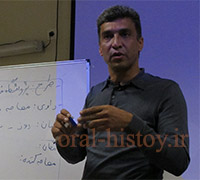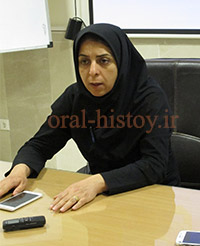Difference between written memories and oral history (part II)
Memoirs are not oral history
Maryam Asadi
Translated by: Fazel Shirzad
2018-5-15
Note: Following report is based on an invitation in which history experts are asked questions about oral history. In this regard, two experts, as their perspective, have answered to one of the questions titled "Difference between written memories and oral history". We'll read these comments as follows.
According to Iranian Oral History website, the wave of writing memory and recording oral history - especially in the field of Islamic Revolution and Sacred Defense - has been culminating since recent decades. But in the meantime, it seems that difference between "memory" and "oral history" is still not clear, and there is no accurate definition of these two historical categories among the authors.
Sometimes, biography and memories of a martyr are written by mother's words and his relatives as a story and published it as oral history. However, structure and framework is different in collecting and editing oral history. Mehdi Abolhassani Taraghi and Mouloud Sotoudeh are asked about difference between oral history and writing memory by Iranian oral history website.

Mehdi Abolhassani Taraghi, an activist in the field of oral history, pointed out his article named "Comparative analysis of writing memory with oral history" in journal "Treasury of Documents" and added: "Many works published as oral history are just a collection of memories."
He explain the concept of "Telling memory", "writing memory "and "oral history": "writing memory is individualized and based on monologue. That is, one person recalls and writes. But in oral history, we have interviews, and this means there is a conversation between two people. The conversation involve questions and answers. This questions and answers are kind of conversation; but, in fact, it is not conversation itself. "
Abolhasani emphasized: "oral history interview is a historical observation. In Harvard's oral history collection, for example, a narrator has told memory in 38 pages; this cannot be considered as an oral history. This is a case of telling memory, because historical process and narration is in a mutual dialogue, question and answer."
The organizer of Oral History Project at the Faculty of Literature and Humanities at Isfahan University added:" In writing memory, narrator leads his words, but in oral history, interviewer sets out starting point. For example, Dr. Abbas Ali Adib wrote his biography and memories, but when I talk to him, I intend to examine his life, and from first to end, we will be based on questions and answers."
Mehdi Abolhassani Taraghi noted: "The subject of memory in history is one person, but in oral history, there are two. Any memory written by himself or herself and by others, daily or cumulatively, is not an oral history."
He introduced the book "Khein's Moonlight" as an ideal example of oral history and added: "If a book is to be published as oral history, it should be published in the form of a question and answer. This is a global standard. The form of collecting books "Da" is based on oral history, but it is not oral history. Oral history is a method; It would be better to say: the memoirs of a person are compiled based on oral history interview method."
Abulhassani emphasized: "The difference between memory and oral history has always been our concern, but unfortunately it is not being paid attention and its rules are not respected. Some of books which have been published in the field of oral history, are not included of oral history."
The author of the book "The Victor of Hills" concluded: "Narration, the foundation and commonalities of oral tradition, oral history and telling memory, but the gender of each different. The narration of oral history passes through filter of the interviewer, and then it should be verified and challenged. But when one says, writes and publishes his memory, there is no longer a challenge. Sometimes, there have been fine cases, which mistakenly because of death of narrators, are lost and evacuation of historical information has not been properly carried out. Unfortunately, the logic of oral history interviews is completely in wrong. "

Mouloud Sotoudeh, another historian in the field of oral history, also has a close idea to Abolhassani: "Memory is a common basis between writing memory and oral history. When people are interviewed, they'll express their memories, but there is a difference in the way and implementation of the two mentioned category that distinguishes them from each other. When a person writes his memoirs, s/he writes whatever s/he remember and won't be judged by someone, and other dimensions of his/her memories won't be consulted.
He added: "Sometimes overall goal will affect telling memory." someone who writes memoirs for a scenario, for example, looks it in different perspectives, and puts out some parts in pale or bold. Although oral history is based on memory, on the other hand, there is an interviewee who belongs to same generation or another. Interviewer asks questions based on available information and different time frame."
The expert of National Library and Archives Organization in the central region (Isfahan) of country pointed to the role of pre-interview studies in oral history and stated:" The interviewee's intellectual basis in oral history is based on archival documents. Sometimes serious criticism is raised during oral history interviews, and force the interviewee to review his memoirs and speak more seriously intellectual support. So interviewer will affect the oral history process."
The interviewer and compiler of book "Unfinished Service" emphasized: "In writing memory, a narrator tells his memories, but in the oral history, interviewer enters into subject with a intellectual support and study. Narrator is examined at various perspectives, and subject is based on the scientific views of all history.
Sotoudeh evaluated oral history more extensive than memory, and added:" Interviewer fairly enters into conversation, and records everything, what is happened about history at that time, based on narrator’s memory."
He pointed out in the end: "History has identity and the oral communication of information has also an independent identity that has been merged into oral history. Memory books can be part of oral history as far as they have not been based on story-telling, but rather fact have been narrated on oral. But if memory books enter into the story-telling, they will be away from the field of oral history. "
Iranian oral history website questions experts about oral history, and publish responses to readers. Total responses will have significant results. If you have any questions, please feel free to submit it via this page to read comments from experts of oral history!
Number of Visits: 6250








The latest
- An Eternal Lie!
- The 368th Night of Remembrance – Part 2
- Agents in Search for the Fighter
- The Embankment Wounded Shoulders – 13
- The Necessity of Standardizing Oral History and Criticism of General Mohsen Rezaei
- The 368th Night of Remembrance – Part 1
- Oral History News of Khordad 1404 (May 22nd – June 21st 2025)
- Najaf Headquarters Human Resources
Most visited
- Oral History News of Khordad 1404 (May 22nd – June 21st 2025)
- Najaf Headquarters Human Resources
- The Necessity of Standardizing Oral History and Criticism of General Mohsen Rezaei
- The 368th Night of Remembrance – Part 1
- The Embankment Wounded Shoulders – 13
- Agents in Search for the Fighter
- The 368th Night of Remembrance – Part 2
- An Eternal Lie!
Operation Beit al-Moqaddas and Liberation of Khorramshahr
After Operation Fat’h al-Mobin, we traveled to Kermanshah and visited Sar-e-Pol-e-Zahab before heading to Ilam. During Operation Beit al-Moqaddas, the 27th Brigade was still receiving support from the West. We maintained contact with individuals who had previously worked in Area 7 and were now leading the brigade. It was through these connections that I learned about Operation Beit al-Moqaddas.Memoirs of Hujjat al-Islam Reza Motalebi
Hujjat al-Islam Reza Motalebi is a cleric from Isfahan. Before the revolution, he was the imam of the Fallah Mosque – which was later renamed Abuzar Mosque. By his presence and efforts, Abuzar Mosque soon became a base for supporters of the Imam and the revolution. After the victory of the revolution, he played a role in uniting forces and maintaining political vitality in southwest Tehran.The Necessity of Receiving Feedback in Oral History
Whenever we engage in a task, we naturally seek ways to evaluate our performance — to correct shortcomings and enhance strengths. Such refinement is only possible through the feedback we receive from others. Consider, for instance, a basketball player whose shots are consistently accurate; should he begin shooting blindfolded, his success rate would rapidly decline, as he would be deprived of essential feedback from each attempt.Sir Saeed
The book “Sir Saeed” is a documentary [narrative] of the life of martyr Seyyed Mohammad Saeed Jafari, written by Mohammad Mehdi Hemmati and published by Rahiyar Publications. In March 2024, this book was recognized as one of the selected documentary biographies in the 21st edition of the Sacred Defense Book of the Year Award. The following text is a review on the mentioned book.

